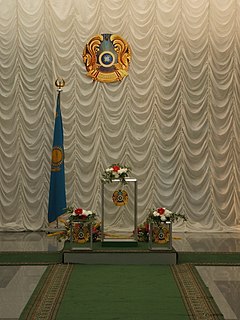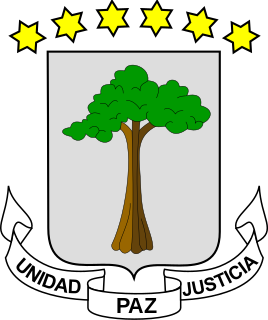 |
|---|
| This article is part of a series on the politics and government of Azerbaijan |
| See also |
The 2005 Azerbaijan parliamentary election was held on November 6. It pitted candidates of the ruling New Azerbaijan Party against opposition led by the Azadlıq (Freedom) bloc of the Azerbaijan Popular Front Party, the Equality Party and Azerbaijan Democratic Party. The polling stations closed 19:00. The result is contested, with allegations of vote-rigging from the opposition and outside groups.

The New Azerbaijan Party is the ruling political party in Azerbaijan. It was formed on 18 December 1992 by the former President of Azerbaijan Heydar Aliyev, who led it until his death in 2003. It is now led by his son, Ilham Aliyev, who succeeded his father as the party leader and as President of Azerbaijan since 2003.
The Azerbaijan Democratic Party, also known as ADP, is a political party in Azerbaijan.
Contents
The Central Election Commission reported, with 28% of votes counted, a 62% win for the NAP, 3% for the Equality Party, 1% for the APFP, 2% to independent candidates and 2% each to two other small parties. These results are contradicted by a Mitofsky International and Edison Media Research poll which found the NAP going from 75 to 56 seats in the 125-member assembly, with the Azadliq bloc getting 12 seats. [1] [2]
Human Rights Watch expressed concern about widespread intimidation of opposition supporters, saying that the elections could not be free or fair under such conditions. [3]

Human Rights Watch (HRW) is an international non-governmental organization, headquartered in New York City, that conducts research and advocacy on human rights. The group pressures some governments, policy makers and human rights abusers to denounce abuse and respect human rights, and the group often works on behalf of refugees, children, migrants and political prisoners.
Intimidation is intentional behavior that "would cause a person of ordinary sensibilities" to fear injury or harm. It is not necessary to prove that the behavior was so violent as to cause mean terror or that the victim was actually frightened.
ARTICLE 19 said Azerbaijani authorities were responsible for the violent harassment of journalists covering opposition rallies, frequent attacks and forced closure of independent media outlets, and widespread abuse of state and local resources in favour of pro-government candidates. [4]
The opposition hoped for another color revolution, but analysts doubted this would happen. Movements like Yox!, Yeni Fikir or Meqam are not ready for revolution yet, according to Emin Huseynov, founder of the former. [5]

YOX! is a nonviolent pro-democracy youth movement in Azerbaijan, which models itself after other colour revolutional youth groups Otpor!, Kmara, Pora (black), Zubr, and KelKel. It means No! in Azeri.

Emin Rafiq oglu Huseynov is an Azerbaijani journalist and human rights activist. He was the chairman of the Institute for Reporters' Freedom and Safety. After he was forced into hiding to avoid arrest in Azerbaijan, Huseynov fled Azerbaijan and is in the process of attaining political asylum status in Switzerland.


















